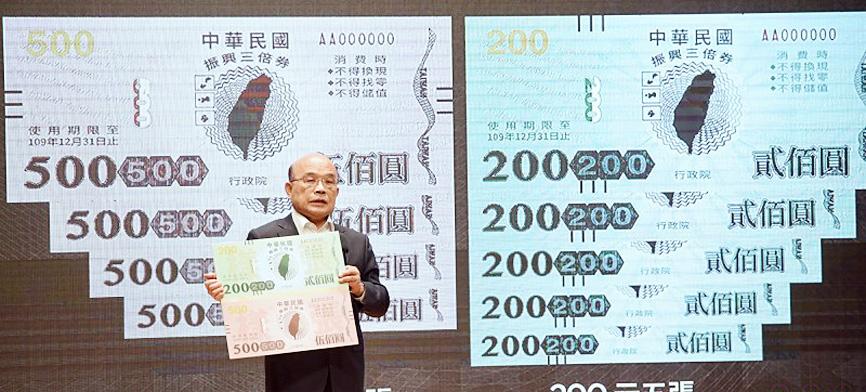A proposed “quintuple stimulus voucher program” is unlikely to expire before some time next year, the Ministry of Economic Affairs (MOEA) said yesterday, adding that internal discussions continue to look at maximizing the vouchers’ effects.
After successfully controling the spread of COVID-19 for most of last year, the outbreak in May had a significant effect on domestic consumption, with the retail sector and the food and beverage sector especially hard-hit.
As the COVID-19 situation is brought under control, the government has been lining up the quintuple stimulus voucher program, modeled on last year’s Triple Stimulus Voucher program, an unnamed source in the ministry told the Central News Agency (CNA) yesterday.

Photo: Lee Hsin-fang, Taipei Times
Under last year’s program, Taiwanese, and later foreign residents, could purchase NT$3,000 in vouchers for NT$1,000.
More than 23.32 million people received the Triple Stimulus Vouchers last year, the ministry said.
However, the vouchers, which were distributed from July last year, had to be used by the end of the year and could not be exchanged for cash, as the government wanted to encourage the public to consume and stimulate the economy, not save the money.
The planned quintuple stimulus voucher program would be similar, while the total sum is to be higher, to reflect the seriousness of the outbreak, compared with the initial wave of COVID-19 infections last year.
However, this year’s program “still has too much uncertainty,” Department of Commerce Deputy Director-General Chen Mi-shun (陳秘順) said.
“We are still in the process of figuring out how to execute this round of stimulus,” Chen said. “There were criticisms of the last round that need to be considered.”
Some retailers, including department stores, are calling for the vouchers to be valid through the Lunar New Year holiday to help spur consumption, CNA reported.
In other news, data released yesterday by the Ministry of Labor showed the number of furloughed workers fell by 1,355 in the first week of August from a week earlier, as employment in the food and beverage, wholesale and retail sectors improved.
As of Friday, the number of workers on unpaid leave was 55,332, down from 56,687 on Aug. 2, the ministry’s data showed.
However, the number of employers who last week implemented unpaid leave programs increased from 4,388 to 4,447.
The increase did not include the food and beverage or accommodation sectors, where the number of businesses implementing furloughs fell by about 10 percent last week, Department of Labor Standards and Equal Employment Director Huang Wei-chen (黃維琛) said.
The travel and tourism industry saw a sharp increase in furloughed workers last week, up by about 2,000 from the previous week, as the government’s COVID-19 relief subsidies to businesses in that sector ended on July 31, Huang said.
While the number of furloughed workers and employers adopting unpaid leave programs would likely fluctuate this month, the labor outlook is expected to improve as some businesses have resumed operations since Taiwan lowered its COVID-19 alert to level 2 on July 27, he said.

The Coast Guard Administration (CGA) and Chunghwa Telecom yesterday confirmed that an international undersea cable near Keelung Harbor had been cut by a Chinese ship, the Shunxin-39, a freighter registered in Cameroon. Chunghwa Telecom said the cable had its own backup equipment, and the incident would not affect telecommunications within Taiwan. The CGA said it dispatched a ship under its first fleet after receiving word of the incident and located the Shunxin-39 7 nautical miles (13km) north of Yehliu (野柳) at about 4:40pm on Friday. The CGA demanded that the Shunxin-39 return to seas closer to Keelung Harbor for investigation over the

National Kaohsiung University of Science and Technology (NKUST) yesterday promised it would increase oversight of use of Chinese in course materials, following a social media outcry over instances of simplified Chinese characters being used, including in a final exam. People on Threads wrote that simplified Chinese characters were used on a final exam and in a textbook for a translation course at the university, while the business card of a professor bore the words: “Taiwan Province, China.” Photographs of the exam, the textbook and the business card were posted with the comments. NKUST said that other members of the faculty did not see

The Taipei City Government yesterday said contractors organizing its New Year’s Eve celebrations would be held responsible after a jumbo screen played a Beijing-ran television channel near the event’s end. An image showing China Central Television (CCTV) Channel 3 being displayed was posted on the social media platform Threads, sparking an outcry on the Internet over Beijing’s alleged political infiltration of the municipal government. A Taipei Department of Information and Tourism spokesman said event workers had made a “grave mistake” and that the Television Broadcasts Satellite (TVBS) group had the contract to operate the screens. The city would apply contractual penalties on TVBS

A new board game set against the backdrop of armed conflict around Taiwan is to be released next month, amid renewed threats from Beijing, inviting players to participate in an imaginary Chinese invasion 20 years from now. China has ramped up military activity close to Taiwan in the past few years, including massing naval forces around the nation. The game, titled 2045, tasks players with navigating the troubles of war using colorful action cards and role-playing as characters involved in operations 10 days before a fictional Chinese invasion of Taiwan. That includes members of the armed forces, Chinese sleeper agents and pro-China politicians